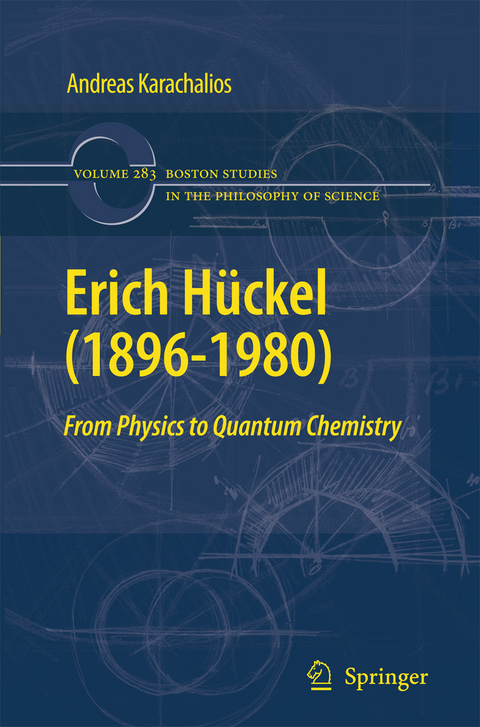
Erich Hückel (1896-1980)
Springer (Verlag)
978-94-007-3155-4 (ISBN)
Emerging disciplines in the border zone between physics and chemistry have 1 attracted the attention of historians of science particularly in the last 20 years. 2 Quantum chemistry, as an offshoot of theoretical chemistry, has recently acquired 3 some importance in the history of chemistry. It is the product of close 1 Cf. Hiebert, E. : Discipline Identi cation in Chemistry and Physics, in: Science in Context, 9(2) (1996), 93-119; Nye, M. J. : Physics and Chemistry: Commensurate or Incommensurate Sciences? in: The Invention of Physical Science, Intersections of Mathematics, Theology and Natural Philosophy since the Seventeenth Century - Essays in Honor of Erwin N. Hiebert. Kluwer Academic Publishers, Dordrecht 1992; From Chemical Philosophy to Theoretical Chemistry: Dynamics of Matter and Dynamics of Disciplines, 1800-1950. University of California Press, Berkeley 1994; Servos, J. W. : Physical Chemistry from Ostwald to Pauling, the Making of a Science in America. Princeton University Press, New Jersey 1990; Chemical Sciences in the 20th Century: Bridging Boundaries, edited by Carsten Reinhard. Wiley-VCH, Weinheim 2001 (incl. a comprehensive bibliography).
2 In an earlier article I point out that the term "quantum chemistry" [Quantenchemie] rst appeared in 1929. To my knowledge it was coined by the physicist Arthur Haas. Talks he had del- ered before the Viennese Chemico-Physical Society in the spring of 1929 are assembled in his book: Die Grundlagen der Quantenchemie: Eine Einleitung in vier Vortrage. It was published by the Akademische Verlagsgesellschaft in Leipzig.
Erich Hückel’s Education and Scientific Awakening: The Path to Quantum Chemistry.- Erich Hückel’s Research Agenda During the 1930s: Underpinning Organic Chemistry with Quantum Theory.- The Controversy Between Erich Hückel and Linus Pauling over the Benzene Problem.- Linus Pauling’s Breakthrough to the Theory of Aromatic Compounds and Hückel’s Reaction.- Hückel’s Efforts to Disseminate His Theory and Its Reception.- Hückel’s Professional Career in National Socialist Germany.- The Postwar Years.- Summary and Concluding Remarks.
From the reviews:“Andreas Karachalios produced a well researched and meticulously documented biography of Erich Hückel … . It is readable and contains a considerable amount of theoretical chemistry that allows not only the evaluation of Hückel’s oeuvre, but informs also about the early development of quantum chemistry in the 1920s and 1930s. It is warmly recommended to all theoretical and computational chemists and to all others who are interested in the history of chemistry during the first third of the twentieth century.” (Istvan Hargittai, Structural Chemistry, Vol. 21, 2010)“This is an important and much needed book. I consider it a must buy for historians of quantum chemistry. Now what we need next is an English translation of Hückle’s autobiography. Chemical Heritage Foundation, are you listening?” Dr. E. Thomas Strom, Dept of Chemistry and Biochemistry, university of Texas Arlington, Arlington, TX 76019-0065With kind permission of Bulletin for the History of Chemistry, vol 35, No. 2 2010
| Erscheint lt. Verlag | 4.5.2012 |
|---|---|
| Reihe/Serie | Boston Studies in the Philosophy of Science ; 283 |
| Zusatzinfo | XVII, 200 p. |
| Verlagsort | Dordrecht |
| Sprache | englisch |
| Maße | 155 x 235 mm |
| Themenwelt | Naturwissenschaften ► Chemie ► Physikalische Chemie |
| Naturwissenschaften ► Physik / Astronomie ► Quantenphysik | |
| Schlagworte | 4n+2 rule • aromaticity • Chemical Bond • Debye-Hückel theory • Erich Hückel • HMO theory • Organic Chemistry • Physical Chemistry • Quantum Chemistry |
| ISBN-10 | 94-007-3155-8 / 9400731558 |
| ISBN-13 | 978-94-007-3155-4 / 9789400731554 |
| Zustand | Neuware |
| Haben Sie eine Frage zum Produkt? |
aus dem Bereich


